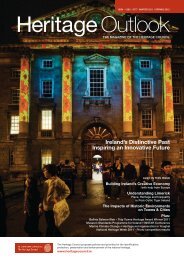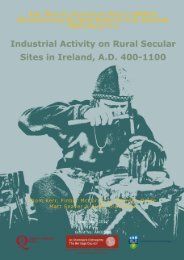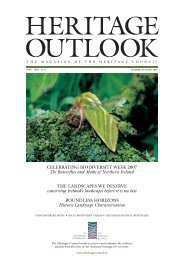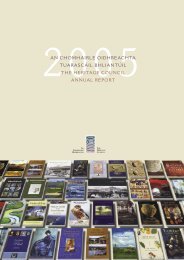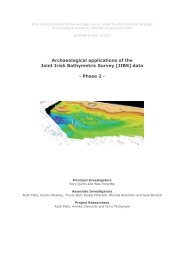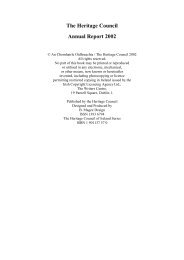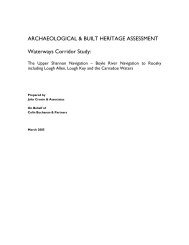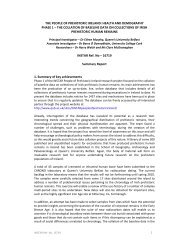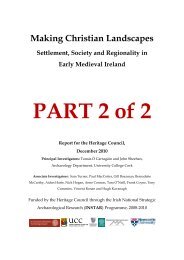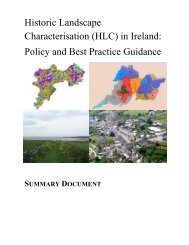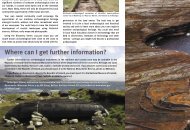Economic Value of Ireland's Historic Environment - The Heritage ...
Economic Value of Ireland's Historic Environment - The Heritage ...
Economic Value of Ireland's Historic Environment - The Heritage ...
You also want an ePaper? Increase the reach of your titles
YUMPU automatically turns print PDFs into web optimized ePapers that Google loves.
2 Importance <strong>of</strong> <strong>Heritage</strong><br />
In this section we consider key aspects pertaining to the role and contribution <strong>of</strong> the historic environment,<br />
focusing on its public good characteristics, the range <strong>of</strong> economic and social benefits it may provide, and<br />
an understanding <strong>of</strong> the rationale for public intervention in the sector. This discussion <strong>of</strong>fers a concise<br />
theoretic context and body <strong>of</strong> reference to the current study.<br />
2.1 Definitions <strong>of</strong> <strong>Heritage</strong><br />
<strong>Heritage</strong> is a diverse and complex sector with a plethora <strong>of</strong> specialist interests reflecting the richness and<br />
diversity <strong>of</strong> the assets which it comprises. At its broadest it may be asserted that the totality <strong>of</strong> the<br />
environment, whether rural or urban, on land or under water, has a historical dimension that contributes to<br />
its quality and character, having been shaped by human and natural processes over thousands <strong>of</strong> years.<br />
Past generations have left their mark in the form <strong>of</strong> monuments, buildings and sites, both in towns and the<br />
countryside, providing a sense <strong>of</strong> place, well being and cultural identity.<br />
More specifically, heritage can usefully be seen as comprising sets <strong>of</strong> 'assets', which may be further<br />
grouped into a number <strong>of</strong> inter-related categories, but especially: (1) built environment (including historic<br />
buildings, monuments and townscapes); (2) archaeological (sites and landscapes); (3) cultural<br />
(museums, archives and libraries); and (4) natural (heritage landscapes, scenic and coastal areas).<br />
2.2 Role and Importance <strong>of</strong> <strong>Heritage</strong><br />
<strong>Heritage</strong> may be valued in a variety <strong>of</strong> ways, both by individuals and communities. <strong>Value</strong> may be<br />
attached to the aesthetic and emotional pleasure gained from experiencing historic sites, through the role<br />
<strong>of</strong> heritage as a contributor to quality <strong>of</strong> life and sense <strong>of</strong> cultural identify, to the economic value which<br />
can be attributed to such sites as generators <strong>of</strong> revenue, jobs and training opportunities. <strong>Heritage</strong> has an<br />
important role as a contributor to sustainable economic growth and the creation <strong>of</strong> attractive communities<br />
that are places where people want to live, work and visit. Unquestionably, heritage represents a valuable<br />
national asset, and one which is fundamental to <strong>Ireland's</strong> core values and principles as a nation 7 .<br />
<strong>The</strong>re is a strong justification for public intervention and investment in heritage on economic grounds.<br />
This rationale for public intervention is based on the correction <strong>of</strong> market failure owing to heritage's public<br />
good 8 characteristics. Specifically, the principal sources <strong>of</strong> this market failure are connected to the<br />
existence <strong>of</strong> positive 'externalities' (or spillovers) under circumstances where market prices are a poor<br />
indicator <strong>of</strong> wider economic and social value. Externalities occur when there is a divergence between the<br />
private costs/ benefits and those experienced by society as a whole.<br />
7 Strategic Plan 2007 – 2011, <strong>Heritage</strong> Council (2007)<br />
8 Public goods are 'non-rival': in other words, consumption <strong>of</strong> a good by one individual does not reduce the<br />
amount <strong>of</strong> the good available for consumption by others. Pure public good are also 'non-excludable'; thus it is not<br />
possible to exclude individuals from the good's consumption.<br />
5



